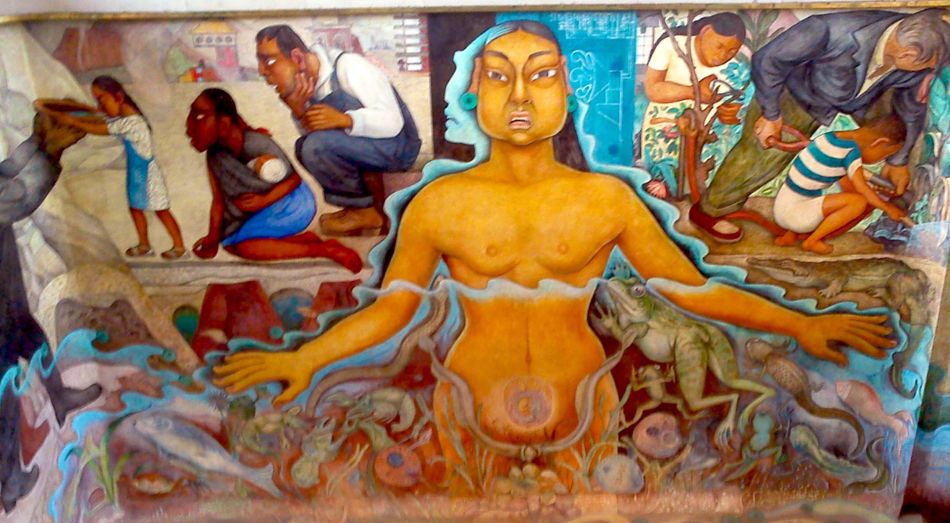How Israel Weaponizes Water
HUMAN RIGHTS, 8 Apr 2024
Vijay Prashad | Tricontinental: Institute for Social Research – TRANSCEND Media Service
Thousands Have Lived without Love, but Not One without Water – Israel is using water as a weapon in its war of aggression against Palestinians by denying access and destroying infrastructure.
4 Apr 2024 – By November 2023, it was already clear that the Israeli government had begun to deny Palestinians in Gaza access to water. ‘Every hour that passes with Israel preventing the provision of safe drinking water in the Gaza strip, in brazen breach of international law, puts Gazans at risk of dying of thirst and diseases related to the lack of safe drinking water’, said Pedro Arrojo-Agudo, UN special rapporteur on the human rights to safe drinking water and sanitation. ‘Israel’, he noted, ‘must stop using water as a weapon of war’. Before Israel’s most recent attack on Gaza, 97 percent of the water in Gaza’s only coastal aquifer was already unsafe for human consumption based on World Health Organisation standards. Over the course of its many attacks, Israel has all but destroyed Gaza’s water purification system and prevented the entry of materials and chemicals needed for repair.
In early October 2023, Israeli officials indicated that they would use their control over Gaza’s water systems as a means to perpetrate a genocide. As Israeli Major General Ghassan Alian, the head of the Coordination of Government Activities in the Territories (COGAT), said on 10 October, ‘Human beasts are dealt with accordingly. Israel has imposed a total blockade on Gaza. No electricity, no water, just damage. You wanted hell, you will get hell’. On 19 March, UN Humanitarian Coordinator for Palestine Jamie McGoldrick noted that Gaza needed ‘spare parts for water and sanitation systems’ as well as ‘chemicals to treat water’, since the ‘lack of these critical items is one of the key drivers of the malnutrition crisis’. ‘Malnutrition crisis’ is one way to talk about a famine.
The assault on Gaza – whose entire population is ‘currently facing high levels of acute food insecurity’, according to Oxfam and the Integrated Food Security Phase Classification – has sharpened the contradictions that strike the world’s people with force. A UN report released on World Water Day (22 March) shows that, as of 2022, 2.2 billion people have no access to safely managed drinking water, that four out of five people in rural areas lack basic drinking water, and that 3.5 billion people do not have sanitation systems. As a consequence, every day, over a thousand children under the age of five die from diseases linked to inadequate water, sanitation, and hygiene. These children are among the 1.4 million people who die every year due to these deficiencies. The UN report notes that, since women and girls are the primary collectors of water, they spend more of their time finding water when water systems deteriorate due to inadequate or non-existent infrastructure or droughts exacerbated by climate change. This has resulted in higher dropout rates for girls in school.
A 2023 study by UN Women describes the perils of the water crisis for women and girls:
Inequalities in access to safe drinking water and sanitation do not affect everyone equally. The greater need for privacy during menstruation, for example, means women and girls and other people who menstruate may access shared sanitation facilities less frequently than people who do not, which increases the likelihood of urinary and reproductive tract infections. Where safe and secure facilities are not available, choices to use facilities are often limited to dawn and dusk, which exposes at-risk groups to violence.
The lack of access to public toilets is by itself a serious danger to women in cities across the world, such as Dhaka, Bangladesh, where there is one public toilet for every 200,000 people.
Access to drinking water is being further constricted by the climate catastrophe. For instance, a warming ocean means glacier melt, which lifts the sea levels and allows salt water to contaminate underground aquifers more easily. Meanwhile, with less snowfall, there is less water in reservoirs, which means less water to drink and use for agriculture. Already, as the UN Water report shows, we are seeing increased droughts that now impact at least 1.4 billion people directly.
According to the United Nations, half of the world’s population experiences severe water scarcity for at least part of the year, while one quarter faces ‘extremely high’ levels of water stress. ‘Climate change is projected to increase the frequency and severity of these phenomena, with acute risks for social stability’, the UN notes. The issue of social stability is key, since droughts have been forcing tens of millions of people into flight and starvation.
Climate change is certainly a major driver of the water crisis, but so is the rules-based international order. Capitalist governments must not be allowed to point to an ahistorical notion of climate change as an excuse to shirk their responsibility in creating the water crisis. For instance, over the past several decades, governments across the world have neglected to upgrade wastewater treatment facilities. Consequently, 42% of household wastewater is not treated properly, which damages ecosystems and aquifers. Even more damning is the fact that only 11% of domestic and industrial wastewater is being reused.
Increased investment in wastewater treatment would reduce the amount of pollution that enters water sources and allow for better harnessing of the freshwater available to us on the planet. There are several sensible policies that could be adopted to immediately address the water crisis, such as those proposed by UN Water to protect coastal mangroves and wetlands; harvest rainwater; reuse wastewater; and protect groundwater. But these are precisely the kinds of policies that are opposed by capitalist firms, whose profit line is improved by the destruction of nature.
In March 2018, we launched our second dossier, Cities Without Water. It is worthwhile to reflect on what we showed then, six years ago:
The Intergovernmental Panel on Climate Change’s Technical Paper VI (IPCC, June 2008) is on climate change and water. The scientific consensus in this document is that the changes in weather patterns – induced by carbon-intensive capitalism – have a negative effect on the water cycle. Areas where there will be higher rainfall might not see more groundwater due to the velocity of the rain, which will create a rapid movement of water to the oceans. Such high velocity rainfall neither refills aquifers (natural water sources), nor does it allow water to be stored by humans. The scientists also predict higher rates of drought in regions such as the Mediterranean and Southern Africa. It is this technical report that put forward the number that over a billion people will suffer from water scarcity.
For the past decade, the United Nations Environmental Programme has warned about the growth of water-intensive lifestyles and of water pollution. Both of these – lifestyles and pollution – are consequences of the spread of capitalist social relations and capitalist productive mechanisms across the planet. In terms of lifestyle use, the average resident in the United States consumes between 300 and 600 litres of water per day. This is a misleading figure. It does not mean that individuals consume such high amounts of water. Much of this water is used by water-intensive agriculture and by water-intensive industrial production, including energy production. The World Health Organisation (WHO) recommends per person usage of 20 litres of water per day for basic hygiene and food preparation. The gap between the two is not accidental. It is about a water-intensive lifestyle – use of washing machines and dishwashers, washing of cars and watering of gardens, as well as the use of water by factories and factory farms.
Water pollution is a serious problem. In Esquel, Argentina, the people saw that the contaminants from corporate gold mining were ruining their drinking water. ‘Water is worth more than gold’ (El agua vale más que el oro), they said. Ruthless techniques of extraction by mining corporations (by use of cyanide) and of cultivation by agribusiness (by use of fertilisers and pesticides) have ruined reservoirs of clean water. Their blue gold, say the people of Esquel, is more important than real gold. They held a public assembly in 2003 that asserted their right to their water against the interests of the private corporations.
It is worth pointing out that the amount of water it would take to support 4.7 billion people at the WHO daily minimum would be 9.5 billion litres – the exact amount used every day to water the world’s golf courses. The water used by 60,000 villages in Thailand, for instance, is used to water one golf course in Thailand. These are the priorities of our current system.
In other words, watering golf courses is more important than providing piped water to the thousand children under the age of five who die every day due to water deprivation. Those are the values of the capitalist system.
_______________________________________________
 Vijay Prashad is an Indian historian, editor and journalist. He is a writing fellow and chief correspondent at Globetrotter. He is the director of Tricontinental: Institute for Social Research and a senior non-resident fellow at Chongyang Institute for Financial Studies, Renmin University of China. He has written more than 20 books, including The Darker Nations and The Poorer Nations. His latest book is Washington Bullets, with an introduction by Evo Morales Ayma.
Vijay Prashad is an Indian historian, editor and journalist. He is a writing fellow and chief correspondent at Globetrotter. He is the director of Tricontinental: Institute for Social Research and a senior non-resident fellow at Chongyang Institute for Financial Studies, Renmin University of China. He has written more than 20 books, including The Darker Nations and The Poorer Nations. His latest book is Washington Bullets, with an introduction by Evo Morales Ayma.
Go to Original – thetricontinental.org
Tags: Capitalism, Crimes against Humanity, Gaza, Genocide, Genocide Convention, Human Rights, Israel, Palestine, Rogue states, State Terrorism, War crimes, Water, Water Rights
DISCLAIMER: The statements, views and opinions expressed in pieces republished here are solely those of the authors and do not necessarily represent those of TMS. In accordance with title 17 U.S.C. section 107, this material is distributed without profit to those who have expressed a prior interest in receiving the included information for research and educational purposes. TMS has no affiliation whatsoever with the originator of this article nor is TMS endorsed or sponsored by the originator. “GO TO ORIGINAL” links are provided as a convenience to our readers and allow for verification of authenticity. However, as originating pages are often updated by their originating host sites, the versions posted may not match the versions our readers view when clicking the “GO TO ORIGINAL” links. This site contains copyrighted material the use of which has not always been specifically authorized by the copyright owner. We are making such material available in our efforts to advance understanding of environmental, political, human rights, economic, democracy, scientific, and social justice issues, etc. We believe this constitutes a ‘fair use’ of any such copyrighted material as provided for in section 107 of the US Copyright Law. In accordance with Title 17 U.S.C. Section 107, the material on this site is distributed without profit to those who have expressed a prior interest in receiving the included information for research and educational purposes. For more information go to: http://www.law.cornell.edu/uscode/17/107.shtml. If you wish to use copyrighted material from this site for purposes of your own that go beyond ‘fair use’, you must obtain permission from the copyright owner.
